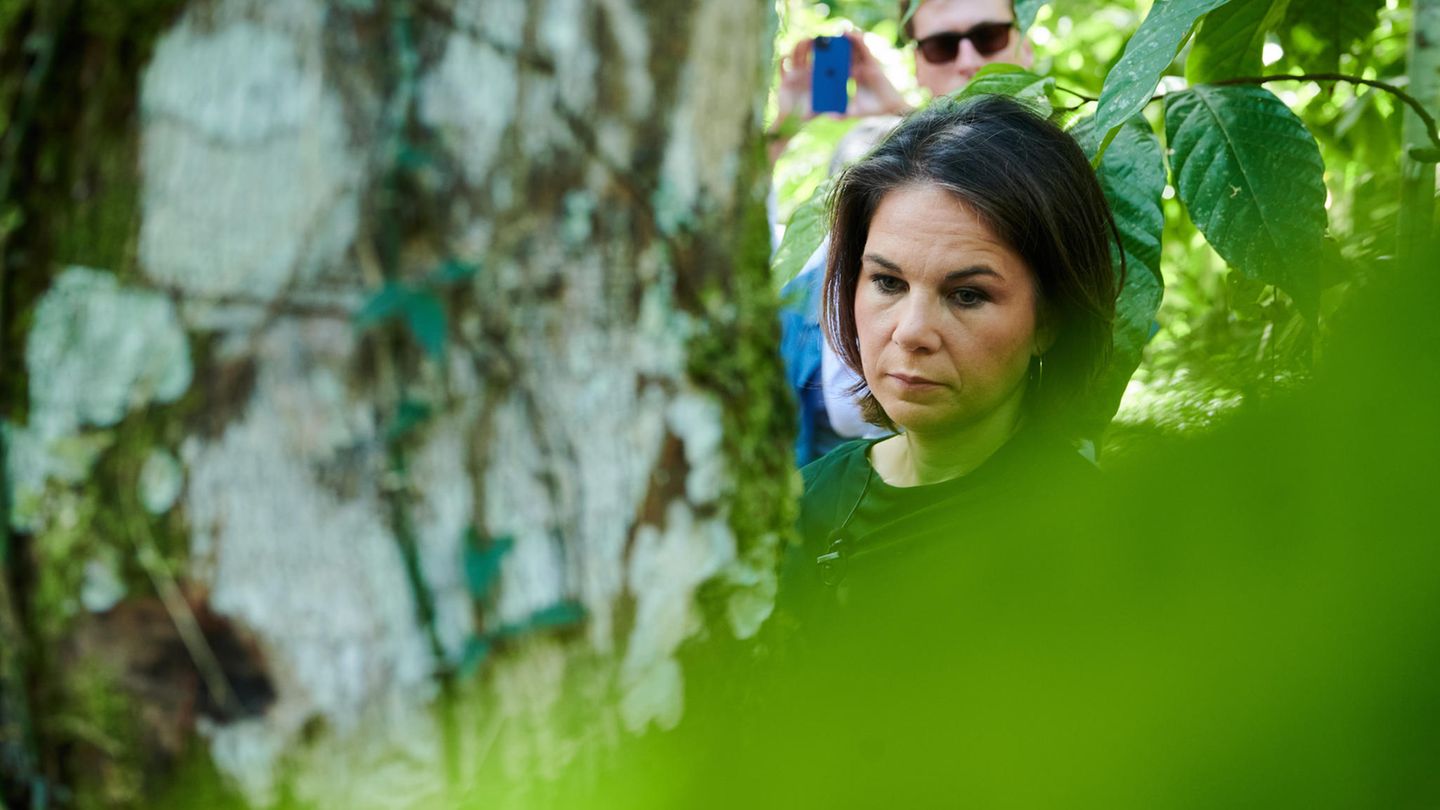On site
The asylum agreement of the European interior ministers causes massive anger among the Greens. Foreign Minister Annalena Baerbock has to change her program in Colombia and reassure her party. The Greens leadership underestimated the issue.
Annalena Baerbock probably already knew that she would not be able to avoid the topic this Thursday in Cali, Colombia. And yet the Foreign Minister still tries in the morning. At a joint press conference with Colombian Vice President Francia Marques, a German journalist asked her about the negotiations on the European asylum reform.
But Baerbock is far away, and that seems to be fine with her. She wants to talk about working with Colombia, not what’s going on at home. So she answers succinctly and coolly: Interior Minister Nancy Faeser is negotiating the compromise at EU level. “And now that I’m far away and with a time difference, I can’t say any more about it.” Questions? Not allowed.
A few hours later it became public what the agreement of the European interior ministers contained: For the first time, asylum procedures at Europe’s external borders are possible. People should be able to be deported directly from central camps after an accelerated asylum check. Due to pressure from the Greens, Germany had also campaigned for these procedures not to apply to families with minors. This exception is not included in the agreement. Europe relies on isolation and deterrence, it is a turning point in asylum policy with explosive force for the Greens – and the traffic light coalition.
Baerbock changes the program to calm the party
The agreement promptly thwarts Baerbock’s program. As soon as the agreement is public, the first Greens react in horror, on social media, within the party. Baerbock has to react – and spontaneously change the program of their trip.
The Foreign Minister is not taking part in a panel discussion on feminist peace policy and the peace process in Colombia. Instead, it is said in passing, she is promoting the compromise with verve in a series of video broadcasts by her party and the parliamentary group. Suddenly she’s not far away, suddenly she’s right in the middle of it again. “Anyone who thinks this compromise is unacceptable accepts that no one will be distributed in the future,” she wrote in a statement.
But many Greens now have questions. How did the compromise come about? Did Baerbock possibly know from the outset that Nancy Faeser would not be able to enforce the request for exceptions?
Like the rest of the party leadership, she was apparently caught off guard by the agreement. Until recently, the Greens seemed to assume that they could at least soften the plans of the interior ministers. Nothing came of it. Now the frustration is building up in the party. The new asylum policy is another impertinence for many in the party. Germany “shouldn’t have agreed” to the reform, criticizes parliamentary group leader Katharina Dröge. Ricarda Lang, the party leader, takes a similar view. Is the traffic light heading for their next big conflict?
In any case, the old camps suddenly break out again in the party. Realos like party leader Omid Nouripour or parliamentary group leader Britta Hasselmann defend the agreement. The party left and the Green Youth chairmen Sarah-Lee Heinrich and Timon Dzienus see the agreement as a serious mistake. A member of the Bundestag writes: “Today is perhaps the most bitter day of my political life.”
Don’t pour populism into law
The Green base has been simmering for weeks. Many in the party fundamentally reject the procedures at the external border. A few days ago, 730 Greens members sent an open letter to their ministers, party and parliamentary group leaders. It says: “We expect that you, together with a lot of tailwind from the party, civil society and science, will help ensure that populism is not cast in law and that we regain hegemony in the debate.”
It’s the closest compromise that’s far from original Green positions. In recent months, the party has agreed that arms will be shipped to Ukraine, that sanctions on unemployment benefits will remain in place, and that nuclear power plants will be allowed to run longer. At party conferences, difficult decisions were discussed, including how much worse it would be if the Greens weren’t in government at all. Now some might be asking themselves: Would that really be worse?
In the evening Baerbock is again on stage with Francia Marques, she holds the laudatory speech at an award ceremony. It could be a nice evening. Before her speech, salsa is danced on the stage, the people in the audience drink fresh juice and are elegantly dressed. An evening to celebrate feminism, the strong women in the world. But Baerbock is hoarse, she seems exhausted and drives her delegation to the plane before the wine is distributed. It’s two in the morning in Germany, so maybe she doesn’t have to make a call for a moment.
But, of course, their next stop, Panama, isn’t far enough away to avoid the debate at home.
Source: Stern
I have been working in the news industry for over 6 years, first as a reporter and now as an editor. I have covered politics extensively, and my work has appeared in major newspapers and online news outlets around the world. In addition to my writing, I also contribute regularly to 24 Hours World.




